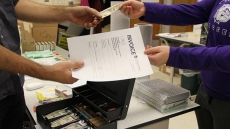OTTAWA - Sexual dysfunction in the Canadian military is such a sensitive topic for the Harper government that federal officials have stamped all information related to it as a cabinet secret, something not to be revealed to the public.
And there are other subjects the federal Conservatives don't want to talk about: Why their planned $2-billion purchase of armoured vehicles was cancelled, for instance. Or how Canada feels about the proliferation of chemical weapons. Or what Transport Canada thought about rail safety criticism from the auditor general.
Those are just a few subjects on a growing list of seemingly routine reports, memos and documents caught up in an enhanced dragnet of so-called cabinet confidences — imposed, The Canadian Press has learned, by way of a stealthy Treasury Board directive in the summer of 2013.
That quiet policy change required bureaucrats to ask departmental lawyers to decide what constitutes a secret, a decision that used to be made by the Privy Council Office, which oversees cabinet matters.
PCO — as it's known — is only asked for guidance in "complex cases only."
As a result, the government's blanket of secrecy has grown ever more broad.
The Canadian Press has found dozens of cases from various departments in which reports, briefing materials and emails have been excluded entirely under Section 69 of the Access to Information Act, which gives officials the power to withhold records because they are meant to be seen only by the federal cabinet.
In the case of National Defence, CP was asking for information related to planned cuts in 2012 to the program that provides free Viagra to the military.
There were 61 complaints last year to Suzanne Legault, the country's information commissioner, about the cabinet confidence clause, almost twice the number in 2012. Figures from the commissioner's office show it used the exclusion 2,117 times in 2012-13, a 20 per cent increase over the year before.
More recent data won't be available until end of 2014, Legault told The Canadian Press in an interview.
She is concerned, however, about how wide-ranging the definition of a cabinet secret has become, especially since once the exclusion is declared, not even she can see the documents in question.
"When you look at the scope of the exclusion, it is extremely broad," Legault said.
"It's very, very broad. It basically catches anything that mentions a record that's a cabinet confidence. In my view, the actual scope of this does not respect fundamental tenets of freedom of information."
Media outlets aren't the only ones for whom the flow of information in Ottawa has slowed to a trickle. Watchdog agencies like the auditor general, the military ombudsman and the parliamentary budget officer are also complaining.
Auditor general Michael Ferguson said last spring that his attempts to audit the long-term health of public pension plans had been stymied by bureaucrats at Finance and Treasury Board.
Ferguson said he was "surprised" at the scope of information officials refused to disclose.
Kevin Page, who took the Harper government to federal court when he was parliamentary budget officer, said the law needs a major overhaul.
"Under my time as the budget officer we were told on numerous occasions — from crime bills to elements of the government's economic forecast to departmental spending restraint plans (post budget 2012) — that Parliament (and the PBO) could not get access to information because it was a cabinet confidence," Page said.
"The stakes were high. The government was asking Parliament to vote on bills without relevant financial information and were hiding behind the veil of cabinet confidence. This undermined accountability for Parliament and the accountability of the public service."
MPs and senators, who are subject to parliamentary privilege, have found their formal written inquiries — known as order paper questions — are also being run through the filter of cabinet confidence by the Privy Council Office.
"Cabinet confidence is invoked so often these days, everything is secret including the colour of the minister's dress on any given day," said Liberal MP John McKay, who held up several examples of his questions — on both defence and the environment — that have been denied.
"To pry information out of these guys that is actually real, useful and meaningful — so people can make independent judgments — has become an such exercise in frustration as to result in a high level of cynicism even when they are telling the truth."
The Harper government has long had a reputation for secrecy. But few have explored in any detail just how many avenues of information are being choked off and what the potential consequences might be.
How much of it is political? How much is bureaucratic?
In responding to the auditor general's complaints last spring, Treasury Board president Tony Clement said the decision to invoke cabinet confidence falls to civil servants, not politicians.
What he didn't say was that the Harper government has made it easier for bureaucrats to say "no," thus burying forever their own mistakes and those of the political masters.
"What I think is starting to happen now is the realization that they can basically shut down any democratic debate to anything that could be embarrassing to the government," said Errol Mendes, a constitutional expert at the University of Ottawa.
"That is the way an authoritarian government behaves."
A Treasury Board spokeswoman said late Friday that the intention of the policy change was "to streamline administrative processes," and noted that only 4 per cent of all access to information requests have been subjected to the cabinet exclusion.
Mendes said it really speeds up the process when everything is withheld.
A cabinet confidence is loosely defined as something that has been prepared for — or seen by — the federal cabinet; protecting those secrets is considered a cornerstone of the parliamentary system.
The old procedure, which had been in place since the mid-1980s, saw each department flag information that might be a cabinet secret and then ask the Privy Council Office to review and confirm the decision.
Once the exclusion is invoked, the records remain sealed off from public scrutiny for 20 years.
Under the new system, in which departmental officials and federal lawyers get to decide what constitutes a cabinet confidence, PCO is only consulted in "certain circumstances," according to an internal memo dated June 26, 2013, and obtained by CP.
The exclusion of the Privy Council Office, which would know for certain what information cabinet has and has not seen, is outrageous, said Mendes, who worked in that office under Paul Martin's Liberals.
Oddly enough, the Conservatives promised in their 2006 election platform to give the information commissioner the power to see the excluded documents, as opposed to receiving a summary report of the justification for the decision.
But that was back when former auditor general Sheila Fraser was being stymied through cabinet confidence declarations in her efforts to investigate the Liberal sponsorship scandal.
Conservatives, at the time, deemed the obstruction so egregious that after being elected they ordered the bureaucracy to release the documents to the auditor, according to former Tory insiders.





